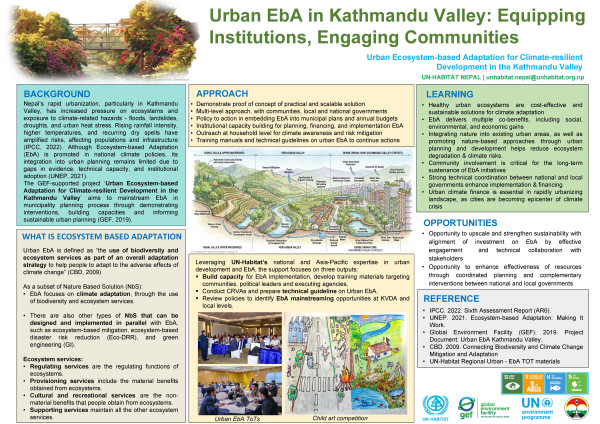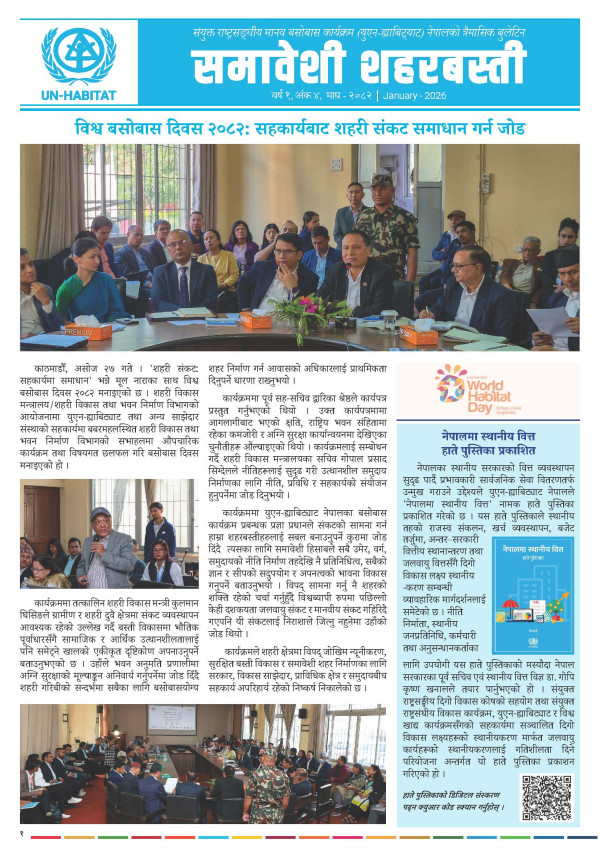UN-Habitat organizes webinar on “Women’s Access to Land and Climate Responsive Land Use”
Highlighting the theme “Gender equality today for a
sustainable tomorrow” UN-Habitat Nepal organized the webinar on “Women’s Access
to Land and Climate Responsive Land Use” ensuring the contribution of women and
girls for sustainable land rights in Nepal.
Primarily the three papers focusing on Women’s Access to
land, Climate Smart Agriculture (CSA) and the gender inclusiveness in the
existing land policy and legislation in Nepal depicts the present scenario of
women in land cum financial rights.
Speaking over the program Janak Raj Joshi, Joint Secretary
from Ministry of Land Management, Cooperatives and Poverty Alleviation
highlighted the major policy intervention in land ownership and land use issues
in Nepal. He emphasized the current legal status and provision of land rights
in the Constitution of Nepal, Civil Codes, National Land Policy, the National
Land Use Policy, the current 15th Periodic Plan, and the amended Land
respectively. The provisions of tax rebate on women’s and joint landownership
resulted legislative provision that all land allocated by the State is
registered jointly in the name of spouses.
Adding on the land rights agenda Kalpana Karki representing
Community Self Reliance Centre elaborated the meagre ownership status of women
on land though they are mostly engaged in agriculture and household
works. She argued that access to land was a key foundation for women
economic empowerment and social stardom. She provided example of how land allocated
for use to poor and vulnerable indigenous community and women groups on the so
far unutilized river’s banks and degraded forests in Dang, Parasi and Bardiya
districts for feeding and forage have improved their economic and social status.
Supporting the government policy of Climate Smart
Agriculture, Shanker Subedi representing Good Neighbor International lauded on
practices and principles of community-based climate smart agriculture targeting
to women. He recalled the figure that 50% of GHGs emission comes from agro
burning, livestock farming and rapid deforestation thereby hampering the
environmental factors. He suggested the line agencies and members for mitigation
and adaptation measures.
Sarika Rai (Prakriti Resources Centre) summarized the
adaptation and mitigation strategies for combatting climate change impacts
through promotion of indigenous knowledge, reforestation, and use of renewable
energy. The participants talked on barrier of land governance, challenges in
linking the root level despite of open-minded people, progressive policy and
legislative provisions. Still there are some barriers. It was raised that some
legislative provisions related to women’s rights on paternal property were
still unclear.
Mamta Bishta from Ministry of Women, Children and Senior
Citizens presented that the Ministry is coordinating with local government in
proper execution of plan and policies. Though Land and women are cross-cutting
issues, the perception and execution of line ministries aren’t in unilinear
mode that creates the dilemma in implementation.
Shabnam Shiwakoti, Joint Secretary from the Ministry of
Agriculture and Livestock Development explained issues associated to women and
agriculture where the women empowerment is possible through income generation,
sustainable agriculture, friendly technology, adaptation measures, legal
literacy and capacity building.
Dr Radha Wagle, Joint Secretary from Ministry of
Forest and Environment emphasized on challenges of social justice and gender
equity due to climate change and land use. She praised the CSA examples
regarding the utilization of unused public land by the deprived women for rearing
the family and upgrading the life.
Ram Prasad Thapaliya, Secretary of Ministry of Land
Management, Cooperatives and Poverty Alleviation conveyed that the Ministry
will be attentive to the issues raised and cautious to address them in three
tier governments. “Without the active and equal engagement of women in land
ownership, the fundamental change in the society isn’t possible.” he added.
Pragya Pradhan, Habitat Programme Manager underlined the
changing social paradigm along with the ownership of women on land along with
the major intervention of project in social change. She elaborated that the
rigorous discussions at community to policy level on land rights could make an
exemplary effort in land ownership.
Women’s access to land is still in miserable status so the
communal approach and effort is required for better tomorrow. The concerned
line ministries and related entities must rethink of developing crystal-clear
policy on land use under contract/ leasehold and enabling environment to
local governments for optimum utilization of unused lands.
UN-Habitat and its implementing partner Community Self
Reliance Centre (CSRC) with the support and in collaboration with Ministry of
Land Management, Cooperatives and Poverty Alleviation (MoLMCPA), Global Land
Tool Network (GLTN) and stakeholders stand together for ensuring land rights to
women.
The programme draws a wide range of participants
from different government and urban/ rural municipalities, academic and land
researchers, NGOs/ INGOs, civil society representatives, and UN agencies
engaging some 45% of female participation.





